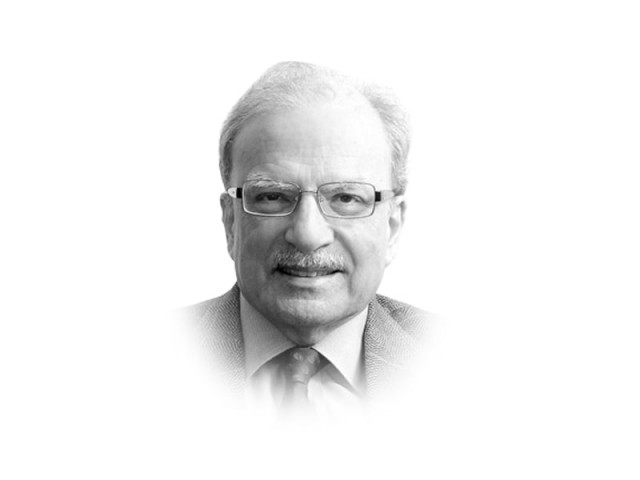Perceptions and public policy
It has become very difficult for Pakistan’s new prime minister to seek a closer working relationship with the US.

The writer is a former caretaker finance minister and served as vice-president at the World Bank
However, passive leadership leaves public opinion to develop on its own or to be influenced by other players in the system. Active leadership, on the other hand, uses the position it occupies to fashion public opinion. Americans have a term for this approach: they call it bully-public, a term introduced into the language by former president Theodore Roosevelt in the early years of the 20th century. It is essentially passiveness on the part of the leaderships in Pakistan and the United States that has allowed extremely negative perceptions to develop among the people about each other. According to a Gallup World assessment issued in February 2013, “with President Obama’s first term characterised by strained relations between Pakistan and the United States, more than nine in 10 Pakistanis (92 per cent) disapprove of the US leadership and only four per cent approve, the lowest approval rating Pakistanis have ever given”. That wasn’t always the case.
The apex of support for the United States was in May 2011. This was in spite of the Raymond Davis case involving a CIA agent in the cold-blooded murder of two young men on a busy street in Lahore. At that time, 27 per cent of Pakistanis had a favourable view of the United States. “Noticeably approval declined after the May 2011 killing of Osama bin Laden, carried out by the US military without the assistance or knowledge of the military in Pakistan — an event that many Pakistanis viewed as a blatant disregard for Pakistani sovereignty,” continued the Gallup World report.
This finding was supported by the surveys conducted by Pew Research’s Global Attitude Project. According to it “as has been the case in recent years, America’s image is the most negative in the Muslim world, especially Pakistan (11 per cent favourable), Jordan (14 per cent), and Egypt (16 per cent).” But religion is not the reason why the citizens of these countries view America so poorly. It appears that the United States is less popular in the Middle East and the countries in that region’s immediate neighbourhood. “But the Muslim world is hardly monolithic. America receives largely positive ratings in predominantly Muslim nations such as Senegal in West Africa and Indonesia and Malaysia in Southeast Asia.”
It is worth noting in the context of Pakistan that 81 per cent of its citizens viewed China favourably. The gap between the favourable views of China and the United States was 70 percentage points, the largest of all the countries surveyed by Pew. Surveys also show that Americans returned the compliment. A Gallup poll, in early 2013, found that the countries most disliked in the United States were Pakistan, Iran and North Korea.
These findings matter for the making of public policy by both Islamabad and Washington. Pakistan has joined the ranks of democratic nations and as such, its leaders must respond to the way the country’s people think about important issues. One of the more important of these is relations with the United States. Given Pakistan’s economic situation it needs America to remain helpful rather than uncaring. Had Pakistan managed its economy differently and reduced its reliance on external capital flows, it need not have been so concerned about the way Americans view it. The same is true for the United States. Pakistan is an important player in the protection of America’s large strategic interests in the geographic area in which Pakistan is located. With each country needing the other, it is important for the two sets of leaders to turn public opinion around. This can be done by showing some honesty in declaring openly and clearly why it is good public policy to work well with the other country.
Shahan Mufti, the author of a recent book on Pakistan, the country of his parent’s origin, argues in a New York Times article that it would have been politically hard for the leaders in both countries to explain why each country needed the other. “Keeping their citizens in the dark, leaders in both nations seem to think would keep cooperation simple,” he writes. In fact, the reverse has happened. It has become very difficult for Pakistan’s new prime minister to seek a closer working relationship with the United States without explaining to his people why that is in Pakistan’s interest. Those who argue for the opposite approach should be challenged to explain how that would be in the country’s interests. The same advice can be given to America’s president, Barack Obama.
Published in The Express Tribune, November 18th, 2013.
Like Opinion & Editorial on Facebook, follow @ETOpEd on Twitter to receive all updates on all our daily pieces.
















COMMENTS
Comments are moderated and generally will be posted if they are on-topic and not abusive.
For more information, please see our Comments FAQ